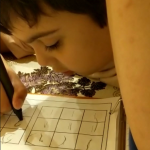Autistic Child Won’t Eat
In autism spectrum disorders, problems with the digestive system are often observed. This is related to a categorical refusal of certain foods, or even proper nutrition in general. However, parents can help in forming healthy and diverse eating habits.
If a child shows food selectivity related to autism, the first step is to rule out any hidden health issues. For example, some coexisting conditions can affect the ability to digest or even swallow certain foods. It’s no surprise that such difficulties lead to stress, and until the cause of the problem is identified, it may be helpful to use supplements that contain all the necessary nutrients.
However, eating behavior issues in autism may be linked to heightened sensitivity of the sensory system and its overload. In this case, following certain rules prescribed by a sensory diet can be helpful.
- Provide a choice. Offering the child several food options will reduce anxiety, as they can choose their preferred dish. It’s also important to include foods with varying textures in their diet, such as carrots, boiled potatoes, or broccoli.
- Don’t rush. Criticism for not eating properly will only increase stress. Gradually diversify the diet and praise the child when they accept the changes.
- Play with food. While it’s generally expected to behave properly at the table, letting the child “play” with a new dish can be a form of interaction, which helps reduce anxiety. Additionally, they may feel calmer and more relaxed if mealtime is accompanied by their favorite music. The less stressful the meal, the more likely the child will begin to view food and eating positively.
- Pay attention to sensory experiences. Many autistic individuals react negatively to the texture of certain foods that cause discomfort. Therefore, by considering this aspect, it’s important to identify what the child prefers and choose foods with similar characteristics.
- Don’t get nervous. It’s important to understand that food selectivity is not a form of protest but rather a sign of difficulties with chewing or perceiving certain dishes. Forcing the child to eat something they find unpleasant will only increase anxiety and stress, worsening the situation. The approach should be gentle, calm, and consistent.
- Positive reinforcement can help. If the child tries something new, reward them with a favorite treat. Positive reinforcement fosters positive behavior, which can lead to the child becoming less picky.
The issue of children’s eating habits is one of the most challenging for all parents, and in the case of autism, the primary goal is to reduce anxiety and stress. A sensory diet can help to some extent. However, the most effective solution to this problem is cellular therapy — a modern and widely recognized technology for alleviating or completely eliminating the symptoms of the disorder. The procedure involves stem cell transplantation, where the cells transform into healthy analogs of the damaged ones, replacing them. This results in the normalization of brain and nervous system activity, and as a result, autism manifestations either disappear or become less pronounced.
The method provides fast and long-lasting results, making other therapies, which play a supportive role, more effective. Therefore, stem cell therapy is actively and successfully used in leading clinics worldwide, including the Mardaleishvili Medical Center. Its doctors have vast experience, state-of-the-art equipment, and the prices for services are lower than in other countries. Another advantage is the assistance provided in preparing for the trip and solving other related issues.
Undergo stem cell therapy — and eating problems will be resolved!
Autism Treatment Center Videos
Autism treatment with own stem cells
Cord blood association congress
International Quality Crown
Autism Treatment Reviews
Autism treatment with own stem cells
The story of Alessandro (6 years old)
Autism Patient Testimonial - Stem Cell Treatment
Clients Testimonials

Feedback from Igor, David’s father (12 years old) Read More

Feedback from Olga, Fedya’s mother Read More

Feedback from Natalia, Radomir’s mother (15 years old) Read More

Feedback from Esther, Samuel’s mother (8 years old) Read More

Feedback from Abibe, Selim’s mother (7 years old) Read More












